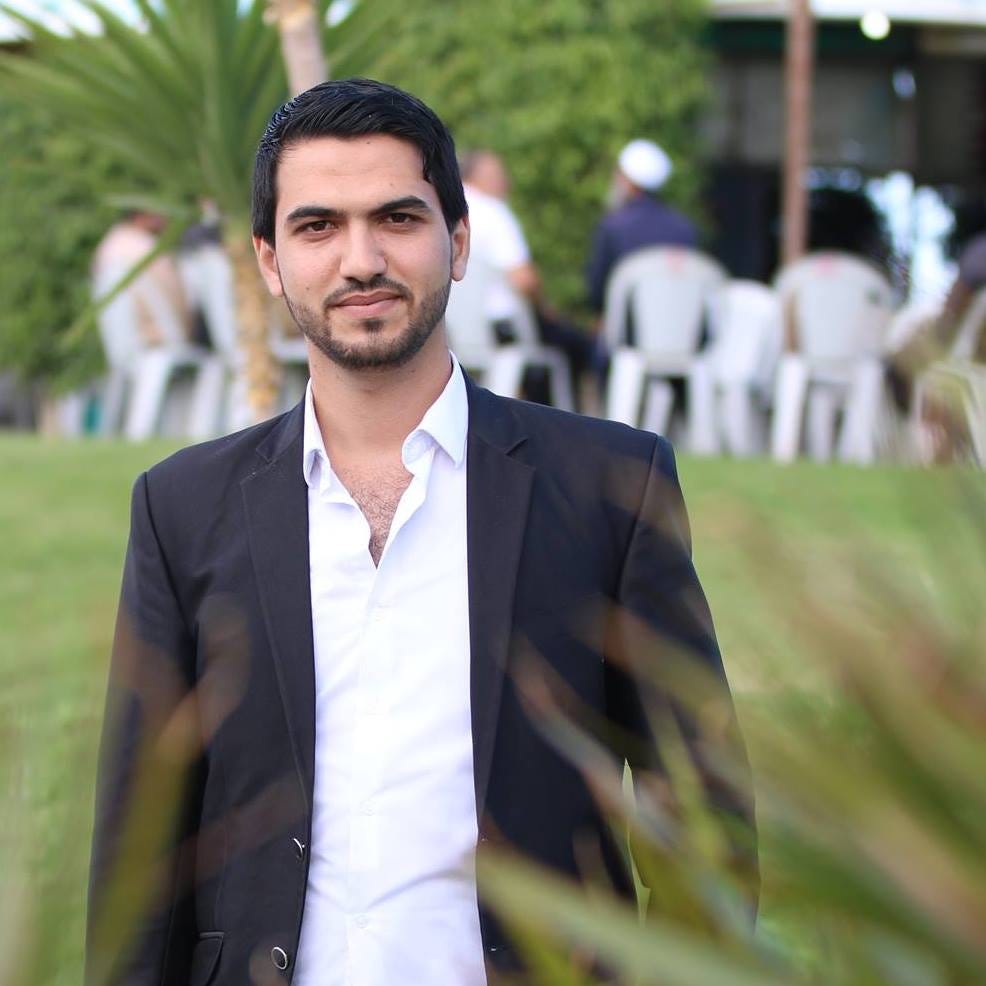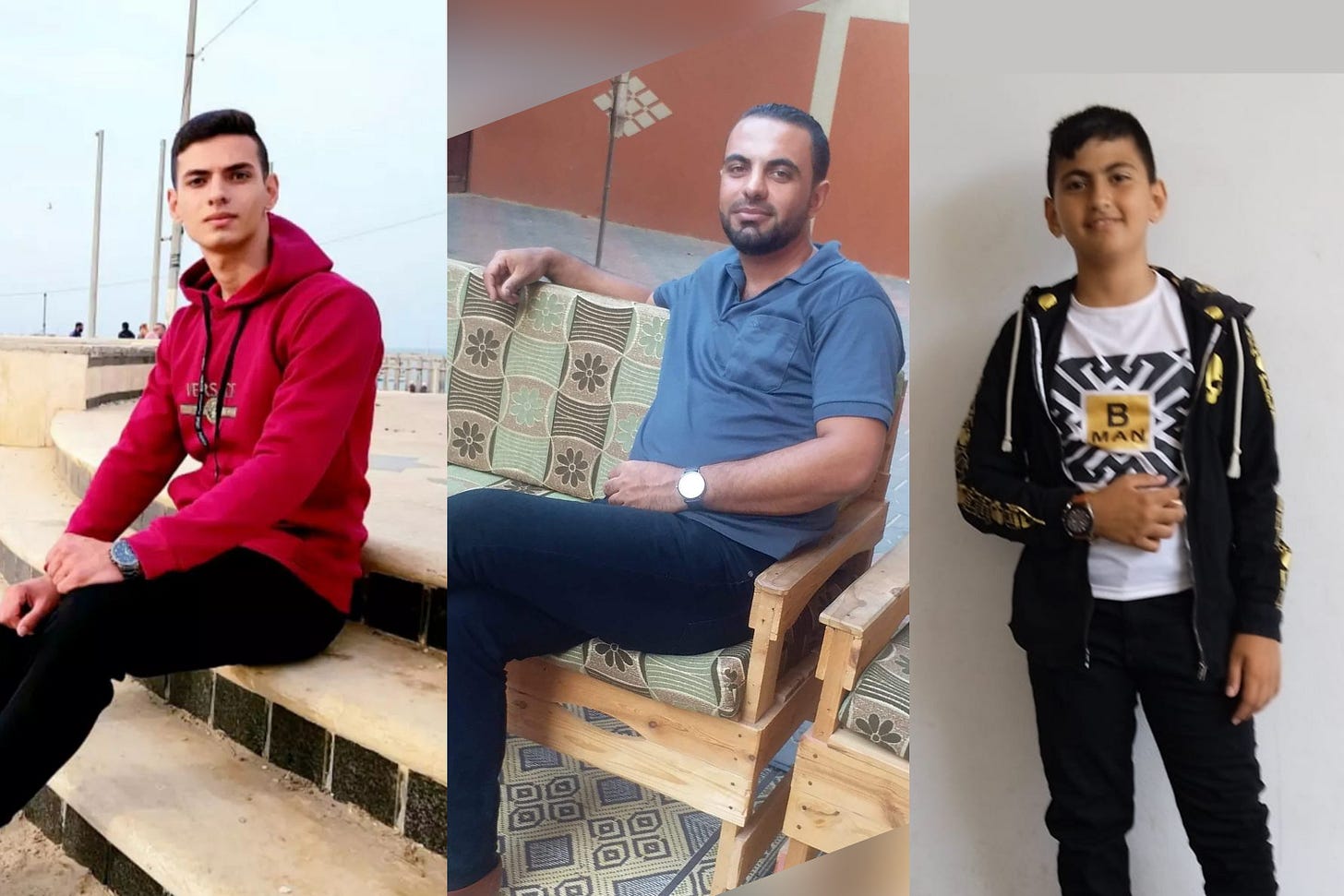“Hosts to the Displaced, Light Bearers in the Darkness” Israel Kills All Six Brothers of the Abu Mahdi Family
"On April 13, Israel killed all six of the Abu Mahdi brothers, my close friends, aged between 10-34."

My life was already unraveling at the seams, and that was before I heard my mother crying.
“Now hasra (grief) is the only language Om Mohammed will speak for the rest of her life,” she quietly sobbed under muffled breaths.
This week, Israel killed all six sons of my mother’s closest friend, all were dear friends of mine too. Their names were Mahmoud, Mohammed, Ahmed, Zaki, Abdallah and Mostafa.
They were all killed in a single airstrike while traveling together from their hometown Deir al-Balah to a community kitchen in Khan Younis where they helped cook and distribute food to the needy.
Exiled in Egypt, having managed to seek refuge from Gaza in April 2024 six months into this genocide, I scrolled franticly through my social media feed looking for someone to message. Someone to say “I’m sorry” to.
But all the brothers’ accounts were silent. And I was left with a grief so disorienting, so incapacitating, I didn’t even know where to send my condolences.
With whom do you mourn when the entire branch of the family tree of some of your closest friends is suddenly cut down?
Just recently I was greeted with a medical diagnosis revealing significant kidney damage. I have also been overwhelmed with work, which has been consuming the little energy I have available for little in return. And then there was heartbreak. What I thought might be the beginning of love turned out to be a misunderstanding, dissolving into awkward silence.
And now this.
My pain—the chronic illness, lost love, economic hardship—they still exist. But now they feel like mere ripples caught in a tidal wave on a different scale altogether.
The Abu Mahdi family lived next door to us throughout much of my life.
During this genocide, our neighbourhood was a ghost town—empty houses, shattered walls and the eerie quiet of lives interrupted; many families were displaced and left our town. Attempting to seek refuge somewhere else in Gaza.
Yet the Abu Mahdi family stayed, as did we. Defiant, but with little other choice.
Not only did we stay, but we opened our doors for displaced relatives who were willing to take the risk of staying with us because of the lack of alternatives. We had no electricity, no running water, and barely enough food.
Solar energy was a rare luxury, yet the Abu Mahdi’s managed to install a small system just before Israel sealed the prison walls of Gaza totally shut. Every day I visited them with our dead batteries and phones, or my laptop, on which I was translating a book by Oxford researcher Kate Pincock titled, "Young People in the Global South: Voice, Agency and Citizenship." Perhaps irony is dead now too.
I was always hesitant, embarrassed to keep asking for help. But every time I did, one of the brothers greeted me with a warm smile, took the items without a trace of reluctance, and sometimes returned them with delicious, freshly baked bread—a rarity that seemed like a miracle.
With wheat priced as high as $150 for 25kg and gas virtually non-existent, they collected wood, put up with the smoke, and shared what little they had. Perhaps that’s why it tasted so unbelievably good.
The Abu Mahdi’s hadn’t just been survivors, they were hosts to the displaced, friends to the weary, light bearers in the darkness. And sometimes, one of the younger boys came by our house to borrow something for their mother—a pot, a gardening tool, whatever was needed. There was an unspoken rhythm between our families, a quiet solidarity that stitched together small acts of kindness in the middle of genocidal chaos.
Of all the brothers, I spent the most time with Ahmed—a quiet thinker, dreamer and striver. He was pursuing his PhD remotely from Yildiz Technical University in Istanbul, and was in the final stages of his thesis: focused on a machine-learning model to predict and control construction project costs—a breakthrough for infrastructure development in volatile environments.
He was waiting for me to edit and complete the final revision. I had helped him edit and review most parts of his thesis; even after I left Gaza, I continued supporting him from Egypt. In return, he offered me something precious during the genocide: something constructive to focus on that used my skills. But most crucially of all, he gave me the honour of having the company of a visionary and inspirational young man.
We encouraged each other, pulled each other forward. He was always praying for me to find profitable work when I managed to reach Egypt. And now, I carry the heavy guilt of not finding time to help him finish that final review sooner. Ahmed deserved the applause of a graduation stage, not the silence of a lonely grave.
Although my relationship with Ahmed was the strongest, each of the Abu Mahdi boys were special to me. I’ll miss Mahmoud’s calm devotion; we’d walk together to the mosque with whispered prayers, even as drones hummed above. I’ll miss Zaki’s unfailing smile when he collected our devices to charge and handed them over with a reassuring spirit.
I’ll miss the polite and humble Mustafa, who helped me load firewood into a two-wheeled cart, which I often borrowed from them when my back was failing. I’ll miss Abdallah, who always came with an infectious smile when borrowing a household item for his mother; he would have had a great future as a salesman. And last but not least I’ll miss Mohammed, the eldest, who anchored the entire family by shouldering responsibilities no young man should carry.
Now they’re all gone, and my grief has no direction. It just sits here, lingering. And I am caught in its vortex. In pain. When a family is taken in its entirety, even condolences lose their meaning, lose their structure. What does a community lean upon when its pillars collapse?
In Gaza, grief comes in waves, but there is never enough time to mourn. There is always another airstrike, another hospital filled beyond capacity, another child who will not live to finish school. And yet, the world keeps turning. The same world that demands human rights for all seems to fall eerily silent when it comes to Gaza.
In the desensitised calculus of genocide, our lives appear to mean little. Just additional numbers to add to the statistics of yet more Palestinian deaths. But we are not numbers. They were not numbers. They were worlds upon worlds unto themselves. Now extinguished.
The scale of the loss really is incalculable.
What will it take for the world to recognise that, among the wreckage, are humans who are, or were, the very best of us?







A very sad memory of loss that is embedded in this genocide and lives on painfully for those like you. Iam so sorry.
Thank you for sharing this. Every time I think Israel can't do anything worse, they do something worse. The killing has to end, stop arming Israel and enabling Genocide